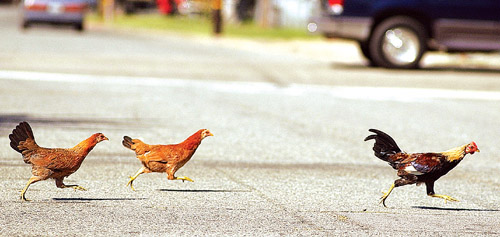They’ve been the topic of heated debate for years. Their
presence has been felt by community members and visitors alike.
They are adored and abhorred, and they don’t even know it.
They are the chickens of San Juan Bautista.
The feral chickens have been an integral part of the small town
for almost 100 years, and yet the debate of what to do with them is
still deliberated on an almost monthly basis at City Council
meetings, as well as the usual scuttlebutt that flies between
neighbors, merchants and tourists.
They’ve been the topic of heated debate for years. Their presence has been felt by community members and visitors alike. They are adored and abhorred, and they don’t even know it.
They are the chickens of San Juan Bautista.
The feral chickens have been an integral part of the small town for almost 100 years, and yet the debate of what to do with them is still deliberated on an almost monthly basis at City Council meetings, as well as the usual scuttlebutt that flies between neighbors, merchants and tourists.
The debate, which has intensified within the past three years, spurs those who think the chickens create a quaint, country-like feel against those who feel they contaminate the town, both literally and figuratively.
“I love the chickens,” Darlene Lamboley, a long time Prunedale resident who shops in San Juan every couple of weeks. “San Juan Bautista wouldn’t be San Juan Bautista without them.”
Whether the town would be the same without them or not is less of an issue than if the town will actually ever be rid of them.
It is most likely an issue that will never get resolved, said City Manager Larry Cain.
“If we took every chicken out of town today, tomorrow or the next day someone would bring some more back,” Cain said.
The city is trying to thin the number of chickens, and some are caught and given to residents of neighboring towns such as Aromas, Cienega, Tres Pinos and Salinas, Cain said.
The debate has been long-standing and some residents have threatened to leave the town because of them. It hasn’t escalated to a level of animosity between people, or residents taking matters into their own hands by disposing of the chickens though, Cain said.
“I would caution anyone against that, because they could be cited for animal cruelty,” he said. “In California, that’s a felony that has jail time with it.”
Whether they make the town what it is or not, they are a detriment to the aesthetics of the town, said resident Jill Ortiz.
“They’re dirty, they carry diseases and they wake me up at 4 in the morning,” Ortiz said. “They make us a laughing stock.”
Quaintness and personal preferences aside, the effect the free-roaming fowl have on their human neighbors’ psyche, as well as the well-being of the chickens themselves, is another story.
“(The chickens) are probably quite happy in terms of their environment,” said Ralph Ernst, a poultry specialist at the University of California, Davis. “People interact a lot with them and some really seem to get something out of the relationship. They find it very positive.”
A person can become so attached to these wild birds that if one suddenly disappears the individual can become quite affected by it, he said.
Adversely, if the clucking and cawing is constantly keeping someone awake, it can affect their overall mood, Ernst said.
“Roosters do a lot of crowing,” he said. “If the person is a light sleeper it can really bother them because of lack of sleep.”
The chickens themselves have become so acclimated to town life that if they were transported back to the wild they would most likely die, Ernst said.
While they can be surprising in their ability to survive, Ernst said, being fed by humans on a daily basis takes away their inherent ability to obtain food on their own.
One of the biggest champions of the chickens is Mary Foletta, the owner of the Washing Well laundromat and other local property. Foletta feeds the chickens every morning at her business on Fourth Street.
“When everything else can become unstable, the chickens are always consistent,” she said. “They don’t care if you have a bad day or a good day, they still come.”
Foletta has met many people who have told her that they come to San Juan Bautista expressly to see the chickens, but that the controversy over the chickens is somewhat blown out of proportion.
“There’s more important things to be worrying about, like the amount of traffic or drugs,” she said. “There are other legitimate concerns here than the poor old chickens.”
Conversely, the weighty transgressions plaguing most other towns is comfortably omitted from the minds of the residents of the sleepy town, which can be nice, Foletta said.
“Everyone likes the slow pace and ease of San Juan,” she said. “Maybe people don’t want to be bothered with the more hectic world and this seems like a simpler thing to debate about.”










